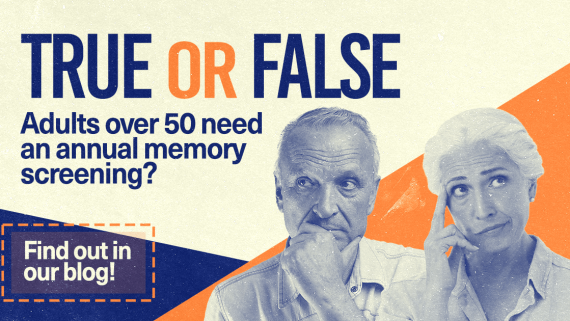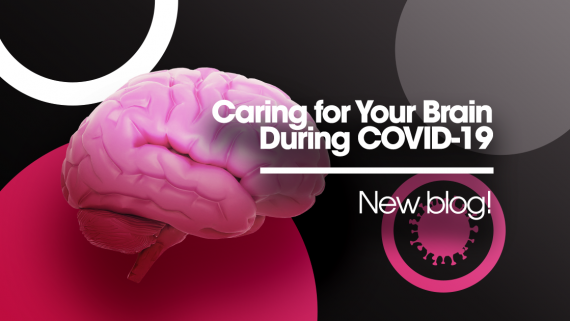This year, National Health Education Week takes place from October 18th through the 22nd. Its purpose is to celebrate the role public educators play in increasing awareness of major public health issues. To commemorate this occasion, ActivMed wants to remind readers about our FREE baseline memory screenings. When it comes to brain health, memory screenings are a great first step.
What is a Baseline Memory Screening?
A baseline memory screening is a series of questions and tasks designed to test memory, language skills, thinking ability, and other intellectual functions. It’s a simple, safe, and quick way to determine your brain health. The screening doesn’t diagnose anything, but it can determine whether or not you would benefit from a full evaluation. The results are given to you right away and can also be sent to your doctor if a follow-up is a recommendation.
The short answer is yes. While some individuals are at a higher risk, anyone can develop Alzheimer’s or other dementia. As we get older, the brain changes, and memory loss and other issues become more common. But how do you know when your memory issues are more than age-related? Memory issues that disrupt your daily life are among the top 10 warning signs that The Alzheimer’s Association lists as reasons to consult your doctor immediately. These include:
Is a Memory Screening Right for You?
- Repeating the same question over and over
- Confusion with time places
- Difficulty completing familiar tasks
- New problems with speaking or writing
Other underlying medical issues and other factors can also cause memory issues. Hence, why you should always get checked out if experiencing any of these symptoms. Treating the underlying cause often improves symptoms.
Added Benefits
The National Institute of Health is now recommending everyone 50 years of age or older gets a baseline memory screening followed by annual memory exams to watch for cognitive changes. You can alleviate any concerns if the screening is negative. If positive, you can take steps that may result in the opportunity to play an active role in:
- Creating or updating advance directives and planning long-term care.
- Ensuring support services and a care network are put in place to help with future medical, legal, and financial concerns.
- Working with caregivers to develop strategies to improve quality of life, make safety modifications for the home, and manage emotions related to the dementia diagnosis.

National Health Education Week is October 18th-22nd. To schedule your FREE baseline memory screening, call us at 978-655-7155 or fill out a request form online today!
Sources:
https://www.nchec.org/NHEW2021
https://www.nia.nih.gov/health/assessing-cognitive-impairment-older-patients
Stress is a way of life these days, it seems. COVID-19 has effectively changed the way we live our lives, at least for the foreseeable future. Most of us know that stress is not good for the body, but do you know how it impacts our health? Prolonged exposure to stress changes the way our brains function. To dive deeper, it reverts to its primitive functions that help us sense and respond to danger. We become faster at solving quick issues but lose the ability to plan or deal effectively with complex problems. Stress doesn’t have to run your life. With a little basic care and healthful changes, you too can embrace the stress.

Stress Relief Tips
There is so much that is beyond our control, and the truth is that stress is ever-present. Fortunately, there are things you can learn to help manage how you react to stress and help you relax your brain.
- Meditation– Meditation can help relax your mind, and help you become less reactive to stress triggers.
- Restructure Stress Response– Cognitive restructuring is a technique that changes the habitual thinking patterns that trigger your stress response.
- Stress Management– Learning more about stress, stress management, and what triggers your stress response will help you feel more confident to handle what life throws at you.
- Confide in Someone You Trust– Talk things out with a trusted loved one instead of staying in your thoughts. Surround yourself with those who will help you identify you are stressed, and when to take action.
Brain Exercises
Taking care of your brain is important at any age. Engaging in regular brain exercises helps improve memory and focus so you can keep up with daily life. In our later years, brain changes begin to affect memory, and these activities become more and more important. Jigsaw puzzles, dancing, learning a new skill, and meditation are some ways you can challenge your mind.
June is Alzheimer’s and Brain Awareness Month. The program’s focus is on providing brain health education, resources, and tools for Alzheimer’s and other forms of dementia. One of the ways they do this is by helping to raise money for the vital research needed to detect, treat, and eventually cure these conditions through clinical research studies.

ActivMed Practices & Research can help you take charge of your brain health. You can get involved by participating in one of the Alzheimer’s research studies at our Methuen location or take advantage of our telehealth memory screens. To learn more about our free telehealth memory screens, call the Methuen office at (978) 655-7155 or by click here.
References:
https://www.sciencenews.org/article/coronavirus-covid19-stress-brain
https://www.verywellmind.com/how-to-relax-your-mind-3144475
https://www.healthline.com/health/mental-health/brain-exercises#focus


